Part 4: We try not to take people’s hate into our hearts
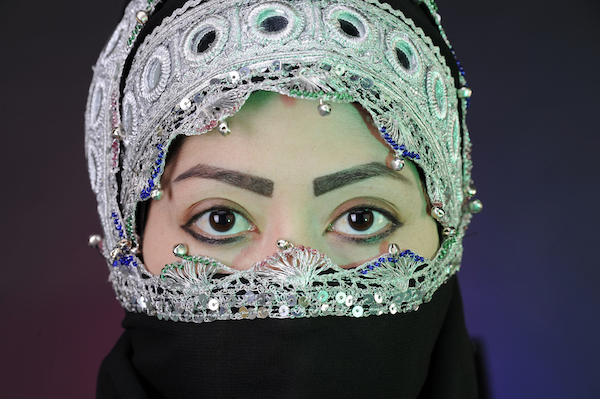
Hi. We’re a group of young Muslim women who live here in Adelaide. We’re interested in exchanging ideas and stories about ways of dealing with weird experiences like being stared at, being yelled at by random strangers driving by in their cars, or other strange stuff that happens here and other places. We’ve included here some of our stories and skills we’ve developed. We’d been keen to hear your ideas!
There are a few different ways that we try not to take people’s hate into our hearts.
Keep yourself upright, smile back and remember you are special to someone
“I remember when a friend who is Asian came to us one day because she was facing racism at uni. She really cried to us and we were listening. We are black and we wear hijabs. She is not Muslim and has light coloured skin, but we knew that the pain she was experiencing from racism was no different and no less than our own. We started saying to her, if you are going through this, just imagine what we go through each day! Her tears dried and she said, ‘How do you do it?’ We said you must keep yourself upright and smile back at them. And then I told her my most precious advice. At those times, when facing hostility, remember you are special to someone. This gives you a purpose. You are precious to your family, or to someone you know who loves you. Remember this at those times. Because this gives you a purpose in life, in love. I say to myself, ‘I am special to someone. I am going to live for them.’ And this gives me back my confidence. Otherwise I could be imagining that people are hating me every single minute. And if you start thinking this, if you start feeling all the time that you are hated, it starts killing you. And you start taking it out on your loved ones.
That’s why I always try to remember I am special to someone. I keep myself upright and, to the hostility, I smile back.”
Replying with humour
“Sometimes we find it’s better to reply with humour and not take it seriously. I am Muslim but I go to a Christian school here in Adelaide and all sorts of things happen that could make me sad or offended but instead I don’t take it seriously.
One student kept asking me, do you always have to wear a blue scarf? He thought that Islam only allowed the colour blue. But this was the colour of our school uniform! It seemed he hadn’t noticed this. One day we had an excursion where we didn’t have to wear a uniform … I wore a rainbow scarf!
In this same school we have to cross ourselves, ‘Father, Son and Holy Spirit’ all the time! Rather than being sad or offended, I just smile.
Everybody is so scared of Muslims at the moment. Humour says we are normal human beings.
My parents are also really funny. My dad is a big Arab man, with a moustache. He can look very scary to others and sometimes he makes fun of this! I am always saying, ‘Dad, you can’t do that! Or you can’t say that’. But he finds himself very funny! And my mum too. I remember when my mother was wearing black, honouring her mother who had passed away. When people would say to her, ‘Why are you wearing black? You must be very hot. Take off your cardigan.’ She would just say, ‘thank you, thank you’ and nod as if she couldn’t understand English. It was very funny. But I was just shaking my head!”
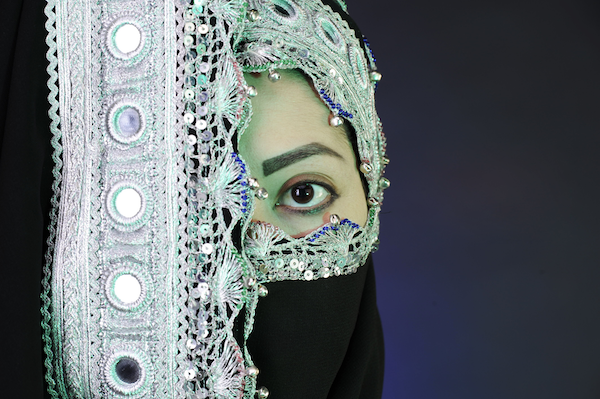
Laughter and friendship
“Laughter is also a way of making friends. When I first came to this country it was my dream to make a white friend. There was this one pretty white girl who I really liked. First we shared humour. Then we shared problems. Then we shared our views. Now many years later we have our own beautician business together!”
Biting back by involving others
“When I was a kid, in primary school, if other kids started to give me a hard time, first of all I’d try not to notice it. To brush it off. But if it continued I’d bite back. I’d take action. It’s not okay. I wouldn’t do this directly. I would involve others, a third party. If a teacher didn’t act, I’d go to my mum.
I still try to do this, to involve others when things are not okay. There was a time recently when I had to go to hospital with my mum. We were sitting in emergency for hours (as you do). And there was this one old man. It always seems to be an old man. He was sitting in the row in front of us. He would turn around to directly face us and just stare. Sometimes staring is worse than saying something because then I can least say something back. When we moved, he would also move. Over time I felt so threatened that I went to the Triage desk and asked them to do something. Just to ask him to stop making us feel so uncomfortable. But they said they could not do anything if he was only staring. I don’t think that’s right. And when things are not right, we need to bite back, and involve others.
When we finish this resource, maybe we can take it to all emergency wards.”
We wish we could control their eyes
“Many of us have to deal with people staring at us. When I am crossing a road, there’s always one person. And on the train there’s one specific man. He sits a few seats away and wears really dark sunglasses. He stares at me for up to 50 minutes. I feel like saying, ‘do you want a picture? It would last longer’.
It’s especially creepy when it’s more than one person staring. I always tell myself, ‘I am not doing anything wrong’. I can’t control their eyes. Sometimes I wish I could! Just make them turn away and get on with their own lives. And I can get on with mine.”
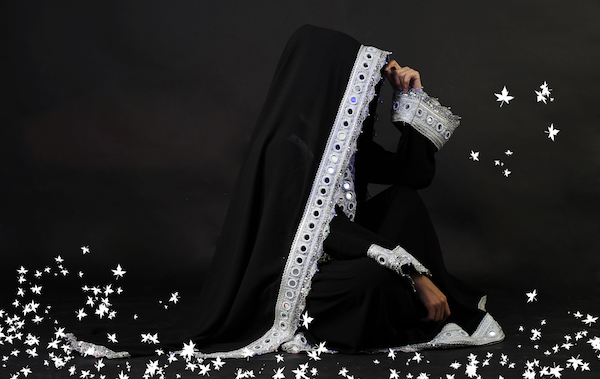
Turning hostility into curiosity
“When I was about 12, I started wearing the hijab at school, and sometimes other students would ask me hostile questions. I took their questions really seriously, much more seriously than they took them. I always assumed they must genuinely want to know the answer to their question. So if I didn’t know the answer, I would look it up. I could go home and ask, or read. And then the next day I would find them and tell them the answer. I don’t like to be left curious, so I’d always give any hostile question a very full answer. Much fuller than they were ever expecting!”
Remembering we have misconceptions too
“I find it helpful to remember that we also have misconceptions. When I first came to Australia I thought we would be riding kangaroos to school. Yes, I was disappointed! And when I saw a big man with tattoos at the airport, he was the Quarantine Officer, I thought he was so scary. But when he opened his mouth to speak he was so sweet! When people have misconceptions about me I try to remember this. It helps somehow.
These are just some of the ways in which we try not to take people’s hate into our hearts.
- We keep ourselves upright and smile back
- We remember we are special to someone
- We reply with humour
- Sometimes we bite back by involving others
- We wish we could control their eyes
- We turn hostility into curiosity – we give very full answers
- We remember we have misconceptions too”
Do you also have ways not to take people’s hate into your hearts? If so, we’d love to hear your stories!
Responding through art from Afghan Youth South Australia
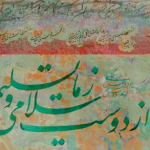 To the authors of ‘We try not to take people’s hate into our hearts’. Your stories are amazing! Fantastic! We loved them. We are a group of young Afghanis, both young women and young men. We also live here in Adelaide. Some of us are artists and photographers. We talked about how some of your stories could be turned into art or paintings or drawings. Would you be interested in this? Maybe we could work together?
To the authors of ‘We try not to take people’s hate into our hearts’. Your stories are amazing! Fantastic! We loved them. We are a group of young Afghanis, both young women and young men. We also live here in Adelaide. Some of us are artists and photographers. We talked about how some of your stories could be turned into art or paintings or drawings. Would you be interested in this? Maybe we could work together?
Thank you!
From Afghan Youth SA.
Members of Afghan Youth SA have created a series of paintings, photographs, songs and video clips inspired by ‘We try not to take people’s hate into our hearts’. You can see some of these artworks throughout this encyclopedia!
Stories from young members of the Muslim Women’s Association of South Australia
Sometimes other people make a difference. When they do, we remember.
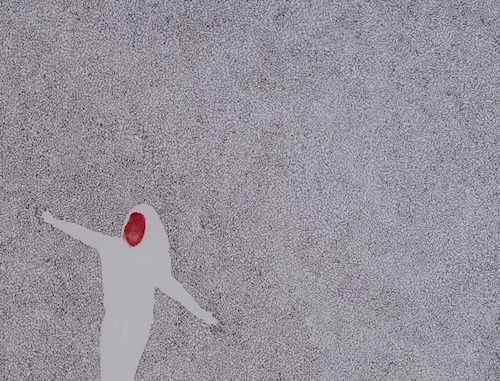
Friends as backup
At school, my friends back me up. They say to me, ‘If anyone says something or hurts you, I’m here. I can get someone or call the Police’. I say ‘Don’t worry, I’m Muslim, I’m Arab, no one is going to mess with me!’ (laughter). I live at Henley Beach and there aren’t many other Muslims around. If we are walking on the beach and someone is really staring at me, my non-Muslim friends might say, ‘What are you looking at?’ I’ve got my friends as backup.
It felt so good not to be alone
Things might be getting worse out in public, on the streets. But they’ve got a lot better on social media. After the Lindt café siege, the “# I’ll Ride with you’ campaign was amazing. We didn’t expect it at all. I was expecting to get attacked. I was scared to go out of the house. And then that campaign started. It was amazing. It felt so good not to be alone.
Kindness
The day after the Lindt café, our next door neighbour came to see us. She brought a box of chocolates. She said ‘please don’t feel you are alone. We are with you’. I really felt this was quite special. Because I had been nervous that day. So that day, when our neighbour brought chocolate, her kindness meant a lot.
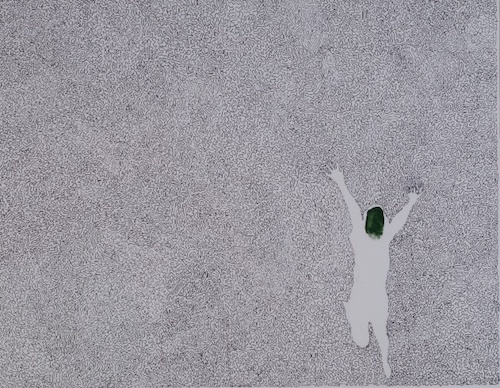
A note on the artwork:
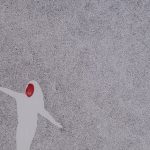
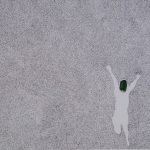
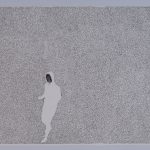
An unexpected journey
‘In these artworks, I captured my journey. I use continuous lines, black, red and green colours and my fingerprints. Each of the artworks contain a figure with a different coloured fingerprint on the face. These fingerprints represent my identity. The colours have been chosen from the flag of Afghanistan and each represents a different meaning. In the first piece, there is a figure with black coloured fingerprint that represents how we come to a new country and experience difficulties of new language, culture and environment. In the second piece, there is a figure with a red coloured fingerprint which means you are fighting and still lost within the new atmosphere. In the last piece, the colour green has been used to represent that after all those experiences of resettlement, independence is achieved as well as success, hope and a bright future.’
Artist
Ziagul Yahya was born in Jaghori Ghazni, Afghanistan and moved to Australia in November 2007.
A note on the artwork:
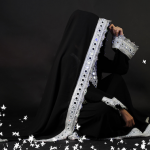
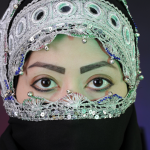
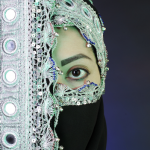
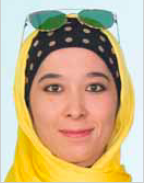
Artist
Pari Moradi is a young Afghan photographer focusing mostly on portraits and landscapes.
We’ve got to work together: A message back to young Muslim women from young LGBTQA+ folks

